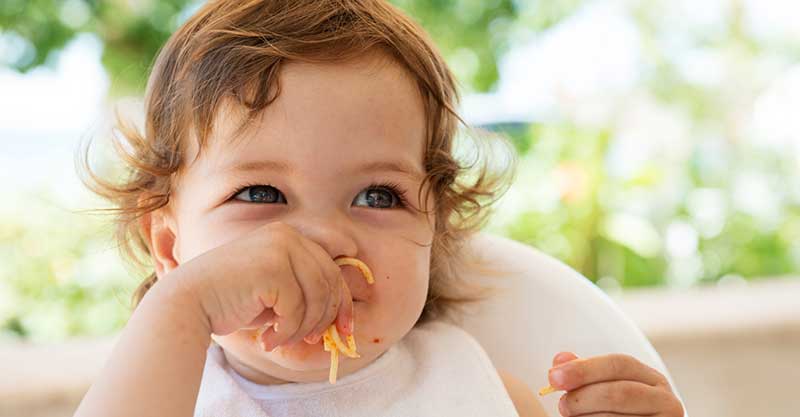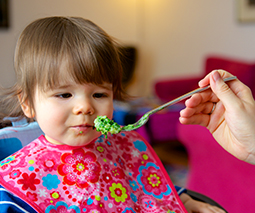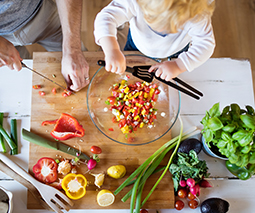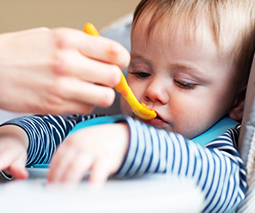New mums! It turns out you can avoid having a fussy eater

When a baby starts eating solids, your focus is probably not on whether they’ll be eating grilled salmon by five years of age.
Fussy eating is not in your vocabulary. “Eating” is a fun new word – with all the delights of seeing your child guzzle down avocado or pureed pumpkin.
If you can avoid having a fussy eater later in life, you should. The joy you feel now as your child eats everything you put in front of them will crumble into the dust of broken dreams. I’m here as the voice of ‘mother future’ to help you avoid the mistakes I have made.
Dr Jennifer Cohen is a paediatric dietician, also known as The Fussy Eating Doctor. She says that while it’s developmentally appropriate for children to be fussy at some point (usually from ten months up to 18 months) there are ways we can ensure it doesn’t continue.
Listen to Dr Jennifer Cohen on Feed Play Love
Here are her tips for setting up good habits early.
1. Introduce a variety of flavours
Don’t wait until they’re saying “no” when you put down their dinner. Introduce a variety of flavours as soon as you can.
Jennifer says, “It’s actually important in those first six months to introduce food with flavour, not bland food. Lots of herbs, lots of spices, lots of different varieties of foods because you want them being exposed to that. You want to teach them early.”
2. Let them experience new textures
My kids got a lot of Greek yoghurt when they started solids. Pureed food might be the easiest way to get a child to eat, but Jennifer says this shouldn’t be our focus. What we need to think about is that our children are learning to chew.
“Learning to chew and swallow is actually a learnt skill. We have to learn it like walking and talking and the way a child learns how to chew and swallow is by doing it. What happens is a lot of kids get started on puree, and that’s fine. But then over time, the textures don’t get introduced. And if you don’t introduce foods with textures and you don’t introduce things like finger foods a child is not going to learn how to chew and swallow.”
Jen says you can introduce finger food from when your baby can sit up in her chair – possibly from six months.
Fun fact; did you know babies don’t need teeth to chew? Apparently gumming works just as well.
Read more about fussy eating:
- The Mediterranean approach: How to stop fussy-eating toddlers in their tracks
- Got a fussy little eater? Here’s 5 ways to win them over
- I realised why it’s such a struggle to get my kids to eat their vegetables
3. Trust their appetite
The temptation, when you’re feeding a baby solid foods, is to keep shovelling food in her mouth. A well-fed baby is a healthy baby, right? Jennifer says parents can forget that a baby is still getting sustenance from either breastmilk or formula. And children can get full quickly.
“When they turn their head away, they’re telling you that they’ve eaten enough. In those early days, you need to let them trust their appetite. When you’re trying to feed them more, you could be overriding their hunger cues which can set you up for problems down the line.”
4. Understand it’s not about nutrition, it’s about forming good habits
This is a hard one to get one’s parent-head around. After all, it’s our responsibility to make sure our children are safe, clothed, fed and watered. But with food, Jen says when babies are still having milk, and are in every other way healthy, meal times are all about getting into healthy habits.
5. Eat together as a family
Research has shown that eating together as a family has a big impact on how your children will feel about food. That means eating a variety of foods and eating well yourself. And eating together.
“It’s amazing what babies pick up even though we think they’re not paying attention. They will watch other family members at a table when they’re having dinner eating different types of foods. It actually sets them up for good eating habits down the track because they’re being exposed to different foods and different eating habits. Research shows that dads play a huge role in this.”
On top of eating together, Jen says we need to start good routines early, like not having any distractions at the dinner table (like toys, iPads or iPhones).
Of course, there are no guarantees that your child will not grow into a fussy eater anyway. But if I could time travel, I’d certainly try all of these steps.
It can’t hurt, and it could ultimately save you a lot of frustrated tears.
** Note: there are some legitimate physical and psychological reasons why children refuse food. If you’re really worried, see a paediatric speech pathologist (who specialises in food) and explain your concerns.








